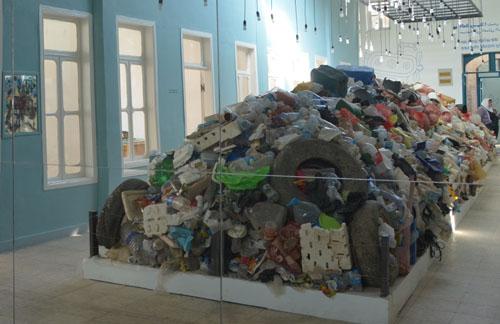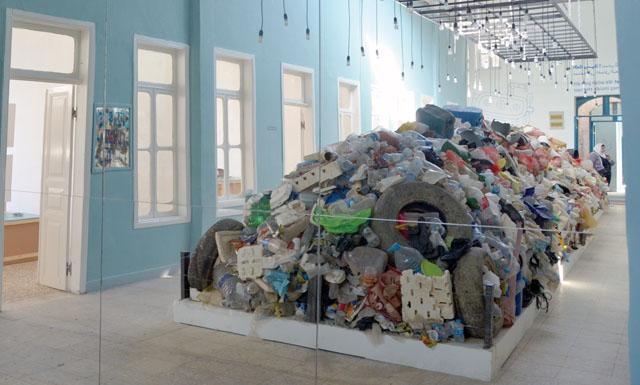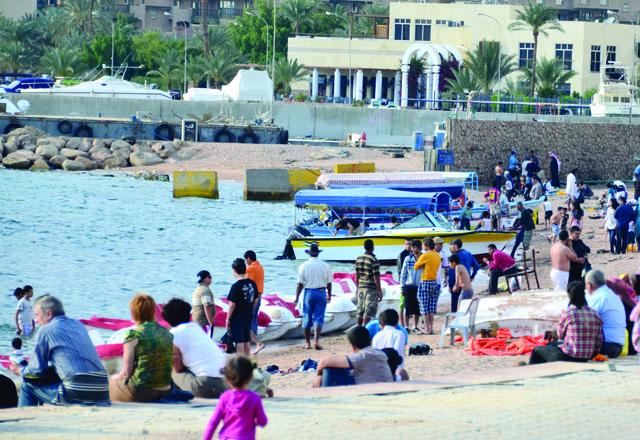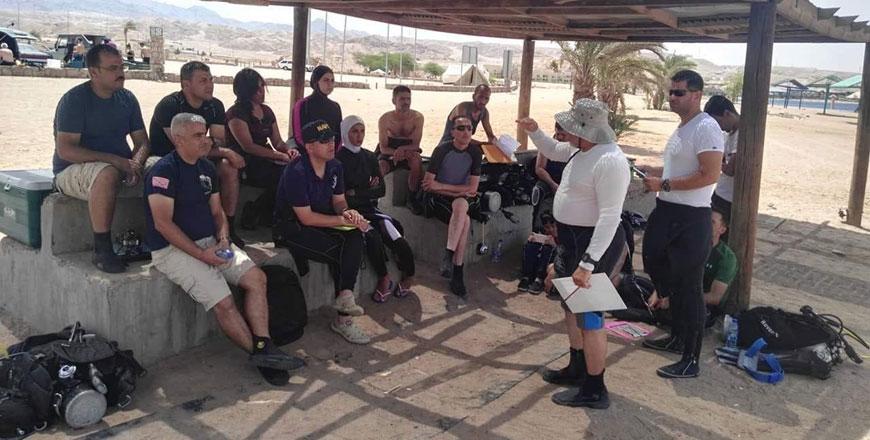You are here
Exhibition seeks to highlight negative impact of plastic garbage on marine life
By Muath Freij - Dec 01,2014 - Last updated at Dec 01,2014

AMMAN – Ihab Eid, who has been diving in the Gulf of Aqaba since 2002, said coral reefs fascinate him and he always enjoys looking at them when he goes to the bottom of the sea.
Eid, however, cannot not enjoy this beautiful scene any longer due to the growing amount of plastic trash surrounding the coral reef.
"It really makes me sad when I dive and see the beauty of the coral reef marred by garbage," the Royal Marine Conservation Society of Jordan (JREDS) programme manager told The Jordan Times.
Eid has taken part in various clean-up campaigns to clear the trash from the seabed and some of the plastic items he collected over the past three months are on display at an exhibition in downtown Amman.
Organised by JREDS and the Drosos Foundation in cooperation with the Museum für Gestaltung in Zurich, the exhibition aims to raise awareness about the danger posed by plastic garbage to the Gulf of Aqaba.
Eid said the “Plastic Garbage - out to Sea?” exhibition will help expose the challenges divers in Aqaba face to those who have not visited the Red Sea resort or are unaware of the negative impact of plastic garbage on the environment.
JREDS Executive Director Faisal Abu Sondos described the exhibition as the first of its kind in Jordan.
"This idea emerged after we noticed the problem of garbage thrown into the sea," he told The Jordan Times in a recent interview.
Abu Sondos, who is also an environmental expert, said JREDS holds more than 12 clean-up campaigns in the Aqaba Gulf annually, collecting around 2.5 tonnes of garbage from the bottom of the sea in one of them.
"This indicates how big the problem is, so we decided to hold such an event."
Abu Sondos said plastic items accounted for more than 65 per cent of the garbage they collected from the sea.
Eid noted that plastic trash endangers Aqaba's coral reef, which extends for 13 kilometres.
"The coral reef is of environmental, social and financial importance for the residents of Aqaba. In terms of the environment, imagine that around 50 per cent of the fish in Aqaba depend on the coral reef because they live there."
He added that the coral reef is also socially important because the two most important jobs in Aqaba, fishing and glass boat trips, depend on it.
"Around 30 to 50 divers go daily to collect plastic trash and do research," he said.
Jane Handal, Drosos' programme manager, said the foundation mainly focuses on the environment, noting that the project was first implemented in Zurich and expanded to all of Europe following its success.
"Now, it has reached Latin America and we also decided to bring it to the countries we work in the Middle East and North Africa," Handal added.
The foundation, which was established in 2003 and is based in Zurich, Switzerland, owes its existence to a private endowment, and is acknowledged as a charitable, nonprofit organisation, according to its official website.
Handal said the exhibition is organised in three Arab countries — Morocco, Egypt and Jordan — and will be held later in Lebanon.
The exhibition is divided into 11 islands with each reflecting one effect of plastic on the seabed and its future impact, according to Abu Sondos.
The items on display were collected during JREDS clean-up campaigns over the past three months, he said.
"We decided to choose downtown Amman to host this exhibition because it is frequented by both Jordanians and foreigners," Abu Sondos added.
The exhibition is being held in a building that once housed one of the oldest hotels in Amman, King Ghazi Hotel, located on Saadeh Street.
Entry is free to the exhibition, which will feature a number of events for both children and adults, and visitors can take part in special events, such as art workshops, storytelling sessions and educational games.
The exhibition, which opened on November 15 and will run until January 15, is open to public from 9pm until 1:30 pm and from 2:30pm until 6:00pm from Saturday until Thursday, according to a JREDS statement sent to The Jordan Times.
Related Articles
Plastic items constituted 65 per cent of the garbage collected from the Gulf of Aqaba last year, according to the results of a study conducted by the Royal Marine Conservation Society of Jordan (JREDS) and released on Wednesday.
One to two square kilometres of Aqaba’s public beaches are lost every year to investment projects, according to marine conservationists.
AMMAN — A specialised training on reef-checking and eco-dive has concluded in Aqaba, producing Jordan’s first certified female divers, marin



















